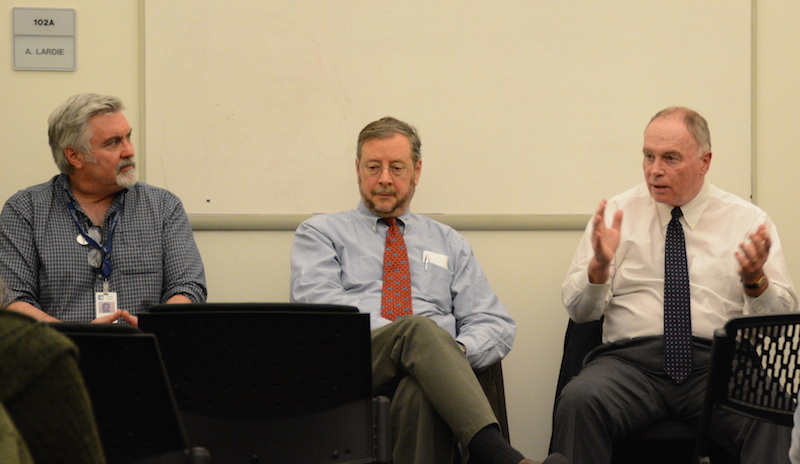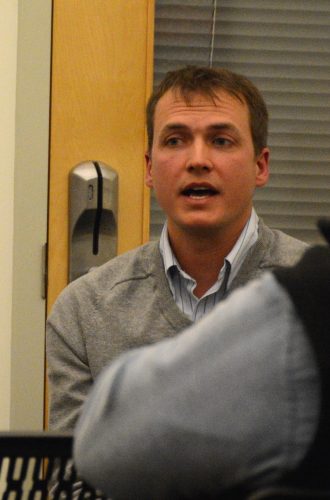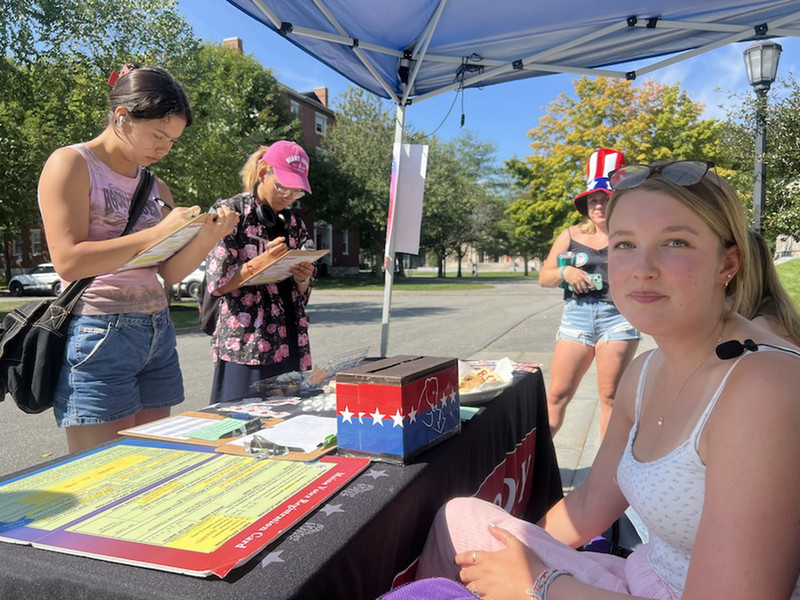Four Alumni in Affordable Housing Describe Their Efforts to Shelter People
By Rebecca Goldfine
The McKeen Center for the Common Good recently hosted a panel of four alumni who are providing affordable housing in Maine and beyond. The four guests work for a social services agency, a law firm, a nonprofit affordable housing investment fund, and a nonprofit affordable housing developer. They answered a range of questions, from addressing the nitty gritty of their jobs to speaking about the entrenched social inequalities, market realities, and political inaction that can lead to homelessness.
The four panelists were Bill Shanahan ’74, president of Northern New England Housing Investment Fund; Cito Selinger ’81, secretary/treasurer of Maine Affordable Housing Coalition; Mark Swann ’84, executive director of Preble Street; and Matthew Peters ’04, vice president of Real Estate Services at Avesta Housing.
The following is an edited transcript of the discussion:
Why affordable housing? What compelled you about this work and drew you to the field?
Shanahan: It is so fundamental for people to have a place to live. It is such a basic building block, and without it, nothing else comes into play.
Selinger: For me as a lawyer, you get a psychological benefit. Yeah, you did a successful transaction, you closed a deal. And because of that, thirty people will have a place to live who might have been living in substandard housing before.

Peters: The humanity piece is huge, and socially, the sense of purpose is really important. It’s appalling that housing is not considered a human right.
Swann: It’s cheaper to house people and support them than it is for them to bounce around from shelter to jail to detox center to shelter to hospitals to emergency rooms, and never get better. Those are very expensive solutions.
Any formative experiences at Bowdoin that influenced your work?
Selinger: I came from a pretty homogenous socioeconomic background where everyone was pretty much the same. At the time [I was a student], Bowdoin seemed diverse—socioeconomically, not so much racially. For me it was an eye opener to be hanging out with kids from Caribou and Augusta. From that I learned a couple of things: That community is made up of lots of different kind folks with lots of different backgrounds. And number two, navigating that successfully without parking yourself in a particular spot involves a lot of skills that have taken me a long time to learn, namely listening and not pre-judging.
Shanahan: I remember the background noise about common good. It was a concept that I had not thought about, and it was a constant while I was here.
The Trump administration released a statement saying it wants to take $54 billion from domestic programs for defense spending. That might be taken away from affordable housing tax-credit programs. How are your firms planning for potential political changes?
Shanahan: You can’t just assume that things will remain status quo, so you’re always defensive about losing your programs and you’re always advocating for them. We’ve been at this for a while, and have created a lot of bipartisan support for the low-income housing tax-credit program. The beauty of what we do is that it is a public/private partnership, which is a Republican hallmark, so we feel pretty good about the story we’ve got and the book of business we’ve built. But we are concerned about it. There are HUD programs that are at risk. If you’re going to work in the nonprofit world, you better get used to adjustment and change because it is constant, you have to be adaptable. We fight the good fight. We use lobbyists. We have a good congressional delegation in Maine right now.
To what extent do you see lack of housing as its own issue or a symptom of other issues?
Selinger: Housing, whether you like it or not, is a basic human need. When you get housed, a lot of other things fall into place—you get sober, you get healthy, you become part of a family. It is the elephant in the room in Congress—they know this, they just don’t have the political guts to say, ‘We need to commit the necessary resources to fix this problem.’ You look at the gentrification going on, even in Portland. If you’re a young couple or young family and want to live on Munjoy Hill, you can’t do it. Multiply that across the country, it’s a huge issue…So you’re making that family spend money on a car, time wasted on commuting, it’s an enormous social issue and it’s not getting it’s due because it gets caught up in, ‘what are we going to do for poor people and why can’t they figure this out?’ Well they would if they could. And the market can’t provide this housing. The low-income tax credit in some way bridges that gap, and if you don’t have that you have nothing.
Shanahan: It is part of economic development. If you want to attract jobs and build an economy, you have to have some place where those people can eat and sleep.
Swann: A huge driver of homelessness in this country are medical issues and lack of healthcare. It is a slippery slope; somebody’s got an apartment and a job, they miss work because they get sick, they get behind in the rent….Homelessness is not just about housing. We were talking at dinner about simplistic knee-jerk reactions we deal with at the local level to shelters, homelessness, or people on the street. It’s amazing how intellectually lazy people can be about what’s going on in country, in the economy, in the healthcare system, the disparities in educational opportunities, with loans. It is very complicated.
What does the common good mean to you? And what are important traits for those who are leading the common good?
Peters: A common trait is humanity, not just for the people you’re trying to serve but also for your coworkers. When you’re doing challenging work, it’s important to keep people’s emotional intelligence up, and to have fun. And humanity for yourself as well, so you can have a life, and family.
Shanahan: Empathy. Take the work seriously, not yourself seriously.
Selinger: Thinking beyond self interest. A lot of these people do what they do not because they want to make money but because they want to do something for someone else.
Swann: Compassion and love, and recognizing that those traits aren’t incompatible at all with working really hard. It’s like pushing a rock up a hill doing this work. And when we’re dealing with a crisis or a challenge or unexpected twist, we always just say, ‘We’ll just work harder than everybody else.’ It’s amazing what you can get done…when you’re just grinding away at it.
Special thanks to Eliza Graumlich ’17 for her help with this story.



